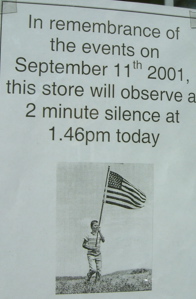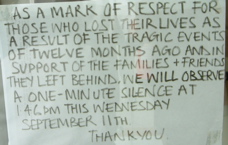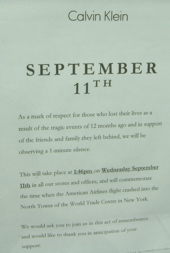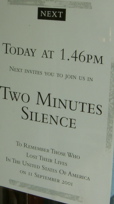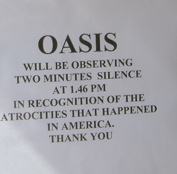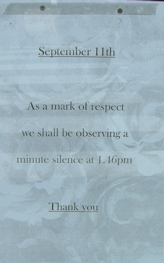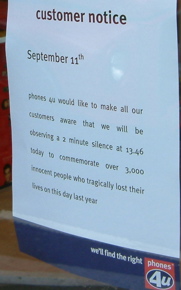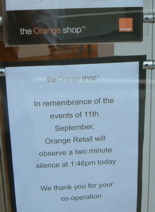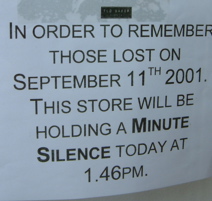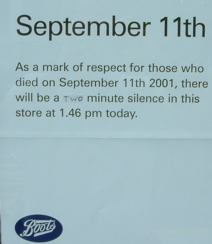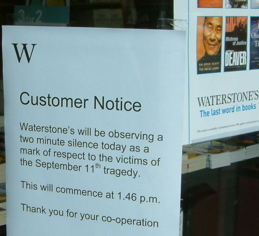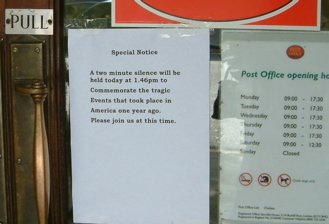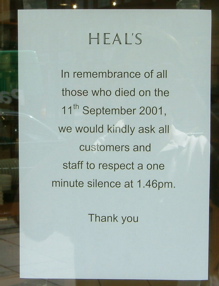We are developing the social individualist meta-context for the future. From the very serious to the extremely frivolous... lets see what is on the mind of the Samizdata people.
Samizdata, derived from Samizdat /n. - a system of clandestine publication of banned literature in the USSR [Russ.,= self-publishing house]
|
Please consider this modest posting as an addendum to David Carr‘s article As good as it currently gets. I have little in the way of words to add to his observations but it seemed to me that the picture below, which I have just taken here in London whilst returning from the supermarket, is a delightful addition.
Alas, grotesque self-publicist, leading Idiotarian and BBC favourite Michael Moore is currently blighting the shores of these sceptred Isles by his rotund presence… but it would seem that some passing Brit with an impeccable interest in Anglosphere affairs has seen fit to ennoble Moore’s poster with some pithy observations of his or her own…
“Congress Falls to Republicans” is how the BBC reports the catastrophic news to impartial observers (or should that be left-wing activists?).
Jeb Bush holds on to the Florida governorship.
President Bush may be a vicious protectionist, but I can’t help feeling that this is one of those days for quiet gloating. Or should that be overt mirth?
I have come across a useful list of terms that I post herewith for the benefit of our US readers. For more insults regarding the common language which divides us, please click on the link. 
British
biscuit
scone
lump of dough
fag
homo
gay
socialist
whig
tory
right-wing tory
green
bloke<
sod
oops
oh
jolly
very
really
quite
guy
bloody
darn
,
.
!
nude
nudity
flat
lift
chemists
loo
complain
chips
maize
corn
coffee
tepid water
cold water
tipsy
drunk
pissed
annoyed
irate
nice
cool
cold
snow
drizzle
rain
light breeze
windy
foreign weather
brolly
telly
umpire
bowler
football
|
American
cookie
biscuit
scone
cigarette
fag
happy
communist
socialist
democrat
republican
tree-hugging
buddy
fuck
fuck
fuck
fucking
fucking
fucking
fucking
motherfucker
motherfucking
motherfucking
, you know
, know what I mean
, man!
pornographic
porn
apartment
elevator
drug store
rest room
sue
fries
corn
grain
espresso
coffee
beer
drunk
plastered
dead drunk
pissed
postal
cool
cold
freezing
snow storm
rain storm
flood warning
wind storm
hurricane
sunshine
umbrella
TV
referee
pitcher
soccer
|
Via Monkeyfarts.
Dr. Jan Fortune-Wood is a freelance writer and home educator. She is a supporter of Taking Children Seriously and writes on home education, autonomous education and non-coercive parenting from a libertarian perspective.
In both the United States and Britain home education is on the increase. Roland Meighan, formerly special professor of education at Nottingham university estimates that at least 1% of school aged children are home educated in Britain. In the United States the figure is 5% with a growth rate of 20% each year and rising. In both the United States and Britain home education is increasingly a step taken by families disillusioned by the provision of mainstream education.
However, the content of this disillusionment seems to vary enormously. In the States, despite a growing number of secular home educators, the religious reason continues to dominate. In a society that separates religion and state, religious parents, especially those on the fundamentalist right are likely to withdraw their children from schooling. In contrast, Britain has no such separation of religion and state. Religious education and a daily act of worship are mandatory in state schools and the government is set to forge ahead with plans to increase the number of state funded schools with an explicitly religious foundation despite the protests of the National Secular Society. Of course, for some religious families this weak inoculation of school based religion is insufficient, especially when evolution is taught routinely in biology classes, but those who withdraw their children for religious reasons are very much in the minority of British home educators.
In the United States, Ronald Presitto1 tells us that the right of parents to raise their children according to their religious convictions is at the heart of the divergence between ‘home schooling’ and the educational establishment. In contrast, most British home educators begin with pragmatic concerns – children are withdrawn when severe bullying incidents fail to be resolved, when they are too bored to tolerate the standardised national curriculum, when their special needs are not taken into account or when the only school place offered is at some dismal, failing institution where you wouldn’t leave a dog. Some do start out with convictions about individualised education or religion, but these are the minority.
What American home schoolers and British home educators have in common is the reaction of their ‘authorities’ to their presence. From local officials to policy makers to government ministers there is a swathe of opinion that believes that parents are not to be trusted with their children and that the State, whether it is secular, socialist or broadly Judaeo-Christian, represents safer hands and inculcates more objective values. Recently in Britain the host of a prestigious legal radio programme (Radio 4 ‘Law in Action’) opined exactly that in his weekly Guardian column – teachers are trained, accredited and hand down the official package to children, but heaven (or not) only knows what parents might be doing to their children. → Continue reading: Behind the scenes in home education
It’s Sunday, and since Friday evening I’ve been staying with my older sister Daphne and brother-in-law Denis in western Wales, in the countryside very near the coast, just east of Fishguard, which is where the ferries to southern Ireland sail from. They’ve been living here for the best part of a decade, but this is my first visit to them. They seem very content. That this is a most beautiful part of the world is true, but to be expected. Countryside, especially if next to the sea and viewed in the fine weather I’ve enjoyed, is beautiful.
Many Samizdata readers will also know two other facts about this part of Britain. First, that Daphne and Denis aren’t the only retired English people living in Wales, and second, that in these parts, although they mostly speak English, a substantial minority of the people speak their own local language, Welsh.
But here’s where it gets interesting. Daphne and Denis are both learning Welsh. They are taking it very seriously. From October 1st of this year until March 31st 2003 (at which time the plan will be reassessed) they will be speaking to each other entirely in Welsh, unless third parties who only understand English are present. Daphne has also told all her local acquaintances that she would also like to speak Welsh with all of them who speak it.
They are not the only retired English expats here to do this, in fact Denis tells me that it was meeting another Englishman who had become fluent in Welsh was what first encouraged him. Welsh classes abound.
Why are these people doing this?
Basically, they are learning Welsh because it is there. Welsh is by far the most substantial non-English language spoken in Britain. Eighteen per cent of the Welsh people speak it, so Denis tells me, and although hardly anyone is fluent only in Welsh, many prefer Welsh and speak it whenever they can. In a mere couple of days I have already experience the feeling of exclusion that you get here as a mono-lingual Englishman. Yesterday Denis and I walked to a local tourist site, an ancient Celtic burial mound with a weird looking mini-stonehenge-like structure on the top which looks down on their home across the valley, and he was soon chatting away in Welsh to some of the other visitors. What were they talking about? And exactly which Welsh words on the bilingual signposts that they have everywhere correspond to which English words on the signposts? If you’re an Anglo living here, that question must occur to you pretty well every time you go out.
Denis is saying to me as I type that there is nothing threatening about this, at any rate not in this bit of Wales – which is known as “Little England”. The Welsh, as I have always found, are charming people. But when Denis switches from English to Welsh, politeness turns at once to genuine friendliness. I remember being told that the Japanese get very twitchy if, when in Japan, you try to speak to them in Japanese. It’s as if you had tried to barge your way into a private club. Here it’s the opposite. Yes, join the club. Come on in and be welcome. So once you start to learn Welsh, you get nothing but help and encouragement from the locals to stick with it.
And the other big reason why these people are learning it is that the Welsh language is, like other mountains that people climb because they are there, a challenge. It is not easy. The first letters of words, for instance, fluctuate wildly according to how exactly the words are being used – who owns it, what they’re doing with it, and so on. There are, apparently, about a dozen different ways of saying “yes”, depending on what exactly is being agreed with. So, an intellectual battle. But intellectual battlers is what Daphne and Denis, and many other retired Anglos out here, are. They had tough, intellectually demanding jobs – they were doctors (like Daphne), lawyers, university professors, highish ranking army people, in other words they are the educated upper-middle classes, which is how they earned the money to buy nice places here. Now they don’t have their challenging jobs any more, and they need new challenges. What better than the challenge of learning the one foreign language that you can learn in Britain that you can actually practise using with the locals for real?
That’s it, that’s the end of this. I don’t know what it means. Very little I imagine. But as a little titbit of life in a corner of the Anglosphere, I think it rates a mention.
It is always a pleasure to meet an American, Mr. Moulton, for I am one of those who believe that the folly of a monarch and the blundering of a minister in far-gone years will not prevent our children from being one day citizens of the same world-wide country under a flag which shall be the quartering of the Union Jack with the Stars and Stripes.
– Sherlock Holmes, as reported by Dr. Watson (from The Adventures of Sherlock Holmes: The Noble Bachelor)
Yesterday I wrote a short article called The real England speaks in which I described a spontaneous expression of transatlantic solidarity. Much to my surprise, I clearly touched a raw nerve and the response was thunderous (see the comments section of the article to see what I mean).
As anyone who has read this blog for more than a few weeks will have surmised, samizdata.net is not just an overtly libertarian group of writers, but represents what can only be described as libertarianism’s ‘hawk’ wing… a sort of anti-anti-war.com. But I was not writing to encourage hawkish memes (well, not that time). In truth, when I wrote my article yesterday, I was not so much extending the sympathy of Britain to our confreres in the United States, at least not as the main thrust of the article, but rather highlighting the existence of a trans-national Anglosphere civil society of sorts that transcends the confines of states and governments.
That does not mean I think the remarkable outpouring of responses was ‘wrong’, far from it… just that it was not my objective and certainly not what I was expecting. Yet the response goes quite some way to confirm the contention of my article that there is indeed an ‘Anglosphere’ civil society and not just the distinct English speaking civil societies around the world, connected by sentiments far deeper than mere politics or state.
Pubs, ladies fashion stores, restaurants, banks, cafes, mobile phone stores, boutiques, gift shops…
If you are looking for the real England, you will not find it in the pages of the Guardian, but rather on the high streets and in the shop windows.
I have just got back from lunch and what I saw on the King’s Road in Chelsea, here in London, amazed me. There is no law requiring it, no government departments ‘encouraging’ it loudly, yet shop after shop are displaying signs saying words to the effects of “At 1:46 pm to day, we will be observing two minutes silence in remembrance of the atrocities on September 11th of last year in the United States.” Others are expressing memorial sentiments, still others just displaying small American flags. No doubt these signs will all be gone by this evening, but they are there now.
Some signs are hand written by shop managers, others were clearly printed by a head office… but the signs are there and they come not from above, passed down from the salons of the chattering classes, but from below, from the true heart of England.
There is indeed an Anglosphere and it is very, very real.
It looks like Tony Blair has decided which of Jim Bennett’s two horses to ride and has selected the Anglospherian one..
It certainly does look like the ducks are lining up in a row really fast now.
On this day in 1814, following the defeat of US Army and Marines defending the capital at Bladensburg, the British military occupied Washington DC, burning most major government buildings.
Perhaps it is time for a really realistic historical re-enactment, starting with 1111 Constitution Avenue, with US taxpayers wearing the Red Coats this time…
Steve Sailer has written a very good article called How tolerant are the British? that takes a good look at Anglosphere attitudes without the rather self-congratulatory tones of many in the blogosphere.
In a rather different article a while back, I came to some similar conclusions and pointed out the agreeabe implications of the high incidence of miscegenation in Britain.
Although he is not the first to comment on the large (and growing) rift between the USA and Europe, James Bennett delivers up a superb analysis of the role of Tony Blair in trying to act as a bridge between them and why he may well end up as political hamburger as a result:
“As always, the biggest problem is the inherent structural one implied in Blair’s strategy: the assumption that by integrating more completely into the European Union, Britain is also serving America’s interests by being a bridge between the two continents. This is not an eccentric position; it has been the standard assumption of the American foreign policy establishment from the end of the Second World War. It is, however, wrong. Where it fails is the assumption that Europe as a whole and America are sufficiently alike that their interests will naturally be aligned.
Jim is spot on. For all his blather about ‘modernisation’, Blair has both feet firmly planted in the past, seemingly unaware of his inability to bridge the gulf between the two civilisations and equally oblivious to the harsh fact that the gulf may not be bridgeable at all. This is not just about the Middle East or Iraq; they are merely symptoms of a divergence that is economic, political, cultural and even spiritual.
In some senses, the EU and Radical Islam have more in common. Their respective visions are, for sure, not the same, but they do share the quality of being a settled view about the way the world should be and neither can really brook any meaningful alternatives, lest their own visions be undermined. For Radical Islam, the answer is endless Jihad; for the EU the answer is the Kyoto Protocol, the ICC and global regulation. In both cases, the message to America is the same: submit.
For the EU elite, America is like a rebellious teenager that they simply don’t understand. How can they insist on sovereignty when it obstructs ‘progress’? How can they insist on the right of self-defence when we know that true security comes only through concessions and negotiation? How dare they cherish Western values when we know that all values are equal? For the Eurocrats, America is not just mystifying, it’s offensive.
But there is also a deeper, darker cause of Europe’s mistrust. The political classes of Europe may disagree on many things but of on one issue there is no dissent: the European Union and the overriding importance of creating a country called ‘Europe’. Everything else, all policy, all laws and all effort must be focussed on melding together a continent’s worth of fractious nations into one monolithic political and social entity with one government, one flag, one currency, one voice etc. They can’t do it and they know in their hearts that they can’t do it. So instead of having an identity, they are creating an anti-identity and that anti-identity is anti-America. It is how the EU will define itself, being unable to define itself by any other totems.
Regardless of the fate of the Iraqi regime, America will most likely get more American and, Europe, with the cancer of post-modernism coded into its DNA, will get more anti-American. Cold War it may not be, but it will be cold. Freezing, in fact.
|
Who Are We? The Samizdata people are a bunch of sinister and heavily armed globalist illuminati who seek to infect the entire world with the values of personal liberty and several property. Amongst our many crimes is a sense of humour and the intermittent use of British spelling.
We are also a varied group made up of social individualists, classical liberals, whigs, libertarians, extropians, futurists, ‘Porcupines’, Karl Popper fetishists, recovering neo-conservatives, crazed Ayn Rand worshipers, over-caffeinated Virginia Postrel devotees, witty Frédéric Bastiat wannabes, cypherpunks, minarchists, kritarchists and wild-eyed anarcho-capitalists from Britain, North America, Australia and Europe.
|



